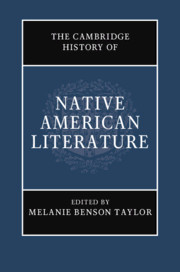Book contents
- The Cambridge History of Native American Literature
- The Cambridge History of Native American Literature
- Copyright page
- Contents
- Figures
- Contributors
- Introduction: What Was Native American Literature?
- Part I Traces and Removals (Pre-1870s)
- Part II Assimilation and Modernity (1879–1967)
- 7 The Multiplicity of Early American Indian Poetry
- 8 Native American Literature in the 1930s
- 9 Black-Indian Literature under Jim Crow
- 10 Transatlantic Modernity and Native Performance
- 11 American Indian Literature and Post-Revolutionary Mexico
- 12 I Kū Mau Mau (Standing Together): Native Hawaiian Literary Politics
- 13 Native Women’s Writing and Law
- Part III Native American Renaissance (Post-1960s)
- Part IV Visions and Revisions: 21st-Century Prospects
- Index
- References
13 - Native Women’s Writing and Law
from Part II - Assimilation and Modernity (1879–1967)
Published online by Cambridge University Press: 18 September 2020
- The Cambridge History of Native American Literature
- The Cambridge History of Native American Literature
- Copyright page
- Contents
- Figures
- Contributors
- Introduction: What Was Native American Literature?
- Part I Traces and Removals (Pre-1870s)
- Part II Assimilation and Modernity (1879–1967)
- 7 The Multiplicity of Early American Indian Poetry
- 8 Native American Literature in the 1930s
- 9 Black-Indian Literature under Jim Crow
- 10 Transatlantic Modernity and Native Performance
- 11 American Indian Literature and Post-Revolutionary Mexico
- 12 I Kū Mau Mau (Standing Together): Native Hawaiian Literary Politics
- 13 Native Women’s Writing and Law
- Part III Native American Renaissance (Post-1960s)
- Part IV Visions and Revisions: 21st-Century Prospects
- Index
- References
Summary
From the eighteenth century, Indigenous women have produced texts in English that reflect and re-inscribe Indigenous principles of law and social order, as well as challenge the force of settler colonial law. Native women writers have made visible the burdens and structures of violence that make Indigenous women and children particularly vulnerable to state disciplinary power (such as public execution, military warfare, massacres, state-sanctioned starvation, and the removal of indigenous children from their families) and extra-judicial violence (land theft, fraud, murder, rape). This essay reviews major works and criticism, organized in three overlapping categories: writing about the law and criminality; writing about prison and carcerality; and writing Indigenous law. These writers mastered new languages and genres to assert Native rights and make legible multiple forms of violence against Native communities. Across time and circumstance, Native women’s writing has had very little distance from the law, or from the law’s claim over their bodies, families, and futures.
- Type
- Chapter
- Information
- The Cambridge History of Native American Literature , pp. 233 - 252Publisher: Cambridge University PressPrint publication year: 2020



